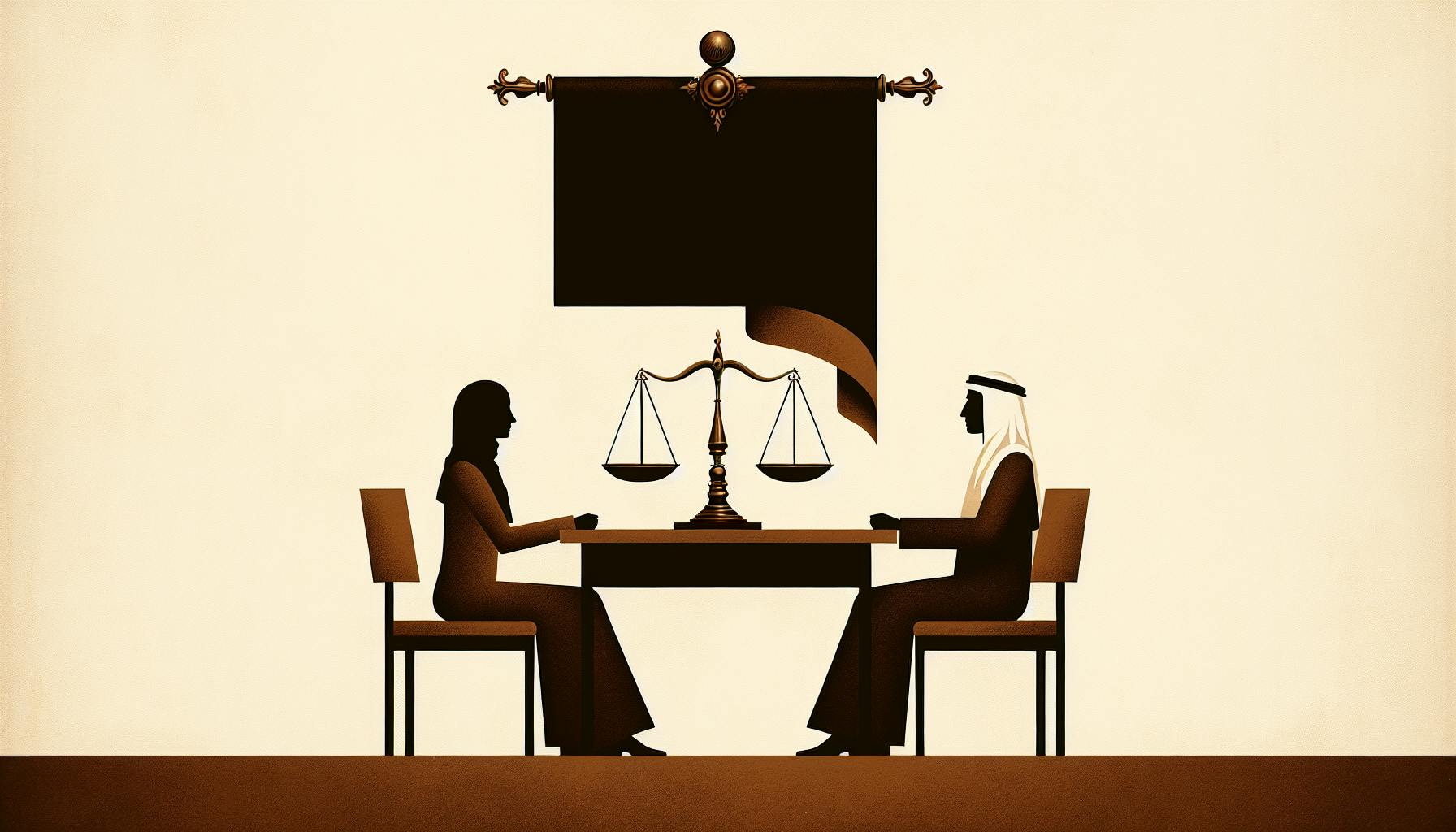Seeking voting equality, Susan B. Anthony courageously defied unjust laws forbidding women from casting ballots.
Understanding the trial and advocacy of this pioneering suffragist provides inspiration and lessons for current social justice efforts.
This article will chronicle Susan B. Anthony's fight for voting rights, her 1873 trial, and its galvanizing ripple effect on the women's suffrage movement.Her enduring legacy continues to motivate civic participation and inclusion today.
Introduction to Susan B. Anthony's Crusade for Suffrage
Susan B. Anthony was a pioneering leader of the women's suffrage movement in the late 19th century. She dedicated over 50 years of her life to the fight for women's right to vote. This background provides context on Susan B. Anthony's early activism and the events leading up to her landmark trial in 1873 for illegally voting as a woman.
Susan B. Anthony's Formative Years and Advocacy
- Born in 1820 in Massachusetts, Anthony was raised in a Quaker family committed to social equality and reform causes.
- She became a teacher at age 17 and began speaking out for temperance, abolition, and women's rights in her 20s.
- In 1852, Anthony met fellow activist Elizabeth Cady Stanton, marking the beginning of a lifelong partnership to advance women's suffrage.
The Seneca Falls Convention and Women's Rights Involvement
- Anthony played a pivotal role in organizing the first women's rights convention in Seneca Falls in 1848.
- This launched the organized women's rights movement and produced the "Declaration of Sentiments" outlining grievances and demands for equal rights.
- Anthony traveled extensively throughout the 1850s and 1860s, delivering speeches calling for abolition and women's suffrage.
The Revolution Newspaper and Suffrage Discourse
- In 1868, Anthony and Stanton began publishing The Revolution, a newspaper designed to engage public discourse around women's rights.
- It provided a vital forum to promote women's suffrage and establish Anthony and Stanton as leading figures in the cause.
What did Susan B. Anthony do to fight for suffrage?
Anthony and Stanton co-founded the American Equal Rights Association to advocate for equal rights for all, regardless of race or gender. In 1868, they became editors of the Association's newspaper, The Revolution, which was instrumental in spreading ideas of equality and women's rights.
Anthony tirelessly lectured across the country to raise awareness and funds to support the women's suffrage movement. Some key actions she took include:
- Organizing state and national women's rights conventions with Stanton, including the first National Women's Rights Convention in 1850.
- Campaigning for passage of the Fourteenth and Fifteenth Amendments to the Constitution to establish voting rights for African American men, hoping it would pave the way for women's suffrage.
- In 1872, Anthony was arrested and put on trial after voting illegally in the presidential election. She used the trial to highlight the injustice of denying women the vote.
Anthony dedicated over 50 years of her life to the fight for women's voting rights. Through The Revolution newspaper, conventions, speeches, and non-violent civil disobedience, she pushed forward the public conversation and awareness around gender equality and suffrage. Her tireless efforts laid the groundwork for the Nineteenth Amendment granting women's suffrage in 1920, 14 years after her death.
Which of the following did Susan B. Anthony fight for a women's suffrage?
Susan B. Anthony was a prominent leader in the women's suffrage movement in the late 19th century. She dedicated her life to fighting for women's right to vote and full citizenship. Some of the key things Susan B. Anthony fought for regarding women's suffrage included:
-
Campaigning tirelessly across the United States through public speeches, petitions, and writings to advocate for a constitutional amendment guaranteeing women the right to vote.
-
Challenging discriminatory voting laws. In 1872, Anthony was arrested and convicted for illegally voting as a woman. She used this to highlight the injustice of denying women the vote.
-
Founding multiple major women's rights and suffrage organizations, including the National Woman Suffrage Association and the American Woman Suffrage Association. These organizations were critical in coordinating and pushing the campaign for voting rights.
-
Lobbying Congress year after year to pass a constitutional amendment for woman suffrage. Anthony testified before every Congress from 1869 to 1906 asking for voting rights.
-
Protesting and engaging in civil disobedience against unjust laws denying women voting and citizenship rights. She believed in taking bold action.
-
Traveling internationally to connect the American women's rights movement with suffrage movements in Europe. This helped strengthen momentum.
So in summary, Susan B. Anthony tirelessly fought for women's right to vote across many fronts - through speeches, writings, organizations, protests, lobbying, and international outreach - all to achieve the ultimate goal of constitutional amendment guaranteeing women the vote. Her life mission was dedicated to women's suffrage.
What does Susan B. Anthony do in the opening paragraph of speech after being convicted of voting?
In the opening paragraph of her "Speech After Being Convicted of Voting," Susan B. Anthony expresses her intention to present a defense as a woman who was wrongfully convicted for exercising her right to vote under the Fourteenth Amendment. She states that she voted in good faith, believing she had a constitutional right to do so. Anthony suggests that the court convicted her on the sole ground that she is a woman, arguing that there was no basis in law for her conviction. She declares her intention to continue the fight for women's right to vote despite her conviction.
Anthony uses the opening paragraph to clearly state the purpose of her speech - to defend herself and continue advocating for women's suffrage in the face of legal persecution. Her tone is defiant yet reasoned as she highlights the injustice of her conviction on the basis of gender alone. She presents herself as a law-abiding citizen denied a basic right, setting the stage to challenge the validity of laws denying women the vote.
sbb-itb-585a0bc
sbb-itb-585a0bc
sbb-itb-585a0bc
sbb-itb-585a0bc
What evidence does Anthony offer to support her claims?
Susan B. Anthony argued that she had the constitutional right as a citizen to vote under the privileges and immunities clause of the Fourteenth Amendment.
Specifically, she offered two main pieces of evidence to support her claims of innocence:
-
The Constitution: Anthony contended that the Constitution made all citizens equal, and therefore she could not be denied the right to vote based on her sex. She cited the preamble of the Constitution which states "We the people," arguing this referred to all citizens, not only men.
-
The Fourteenth Amendment: Passed after the Civil War, Anthony argued this amendment guaranteed her the privileges and immunities of all citizens, which she believed included the right to vote. The amendment states: "All persons born or naturalized in the United States...are citizens of the United States and of the State wherein they reside. No State shall make or enforce any law which shall abridge the privileges or immunities of citizens of the United States."
Anthony leveraged these core documents to assert her rights as a citizen, making the case that existing laws denying women the vote were unconstitutional. However, the judge rejected her evidence, ruling that despite the Fourteenth Amendment, women were still not legally permitted to vote.
The 1873 U.S. District Court Trial of Susan B. Anthony
Susan B. Anthony's 1873 criminal trial for illegally voting in the 1872 presidential election marked a significant moment in the fight for women's suffrage in the United States. Anthony deliberately violated laws prohibiting women from voting to challenge the injustice of denying women this basic right. Her trial drew national attention and spotlighted the suffrage movement's push to extend voting rights to women through the Fourteenth Amendment.
The Enforcement Act of 1870 and Anthony's Arrest
Anthony was arrested in Rochester, New York on November 18, 1872 for casting a vote for Ulysses S. Grant in the presidential election two weeks earlier. She was charged with voting illegally under the Enforcement Act of 1870, which prohibited denying citizens the right to vote on basis of race, but did not specifically extend voting rights to women. Anthony aimed to test whether the Fourteenth Amendment's provision of national citizenship and equal protection effectively enfranchised women voters.
Prosecution witnesses included the election inspectors that allowed Anthony to vote and later rejected her ballot. The defense argued that she had not acted fraudulently and the inspectors had no right to reject her vote.
The Fourteenth Amendment's Role in Anthony's Defense
Anthony's defense team, led by Judge Henry R. Selden, asserted that the Fourteenth Amendment's granting of citizenship and equal protection under the law authorized her to vote. They argued its intent was to prohibit any denial of civil rights on account of sex. However, the amendment referred only to "male citizens" in regards to voting rights.
In her statement to the court, Anthony famously declared "All persons are citizens," not just men. She maintained the Constitution's failure to prohibit women from voting effectively gave them that right as citizens.
The Verdict: A Turning Point in Women's Suffrage
At the trial's conclusion, Judge Hunt directed the jury to find Anthony guilty, refusing to allow her constitutional argument to be considered. Though she was fined $100, Hunt suspended the sentence so the case could not be appealed to a higher court. Nevertheless, the trial was a symbolic moral victory, garnering support for the push to extend voting rights to women through a Constitutional amendment.
Anthony's courageous act of civil disobedience and its legal consequences forced wider recognition of the suffrage movement. By spurring public debate over a woman's right to vote as a citizen, her trial marked a turning point in the long campaign for women's equality at the ballot box.
The Ripple Effect of Anthony's Trial on Women's Suffrage
Nationwide Activism Sparked by Anthony's Trial
Susan B. Anthony's act of voting illegally in the 1872 presidential election, and her subsequent trial, sparked outrage and renewed activism across the country. Supporters held protest meetings and rallies, seeing her trial as an injustice against women's rights.
This reaction showed the momentum the women's movement had gained. Anthony became a symbol for the suffrage cause. Her trial brought more attention and support to the push for voting rights for women.
The Schism of Suffrage Movements: AWSA vs. NWSA
However, Anthony's trial also led to a split in the women's suffrage movement over strategy. Some activists believed focusing on a state-by-state approach was more practical, leading them to form the American Woman Suffrage Association (AWSA).
Others wanted to push for a federal constitutional amendment, forming the National Woman Suffrage Association (NWSA) led by Anthony and Elizabeth Cady Stanton. This divide weakened the movement's political power for over 20 years.
The Road to the Nineteenth Amendment
It would take decades more work before the 19th Amendment finally granted women's right to vote in 1920. But Susan B. Anthony's willingness to face arrest and trial marked a turning point that built momentum toward this goal.
Her defiance inspired future generations of suffragists. So while divisive at first, the ripple effect of Anthony's trial ultimately helped lead to success.
Susan B. Anthony's Enduring Influence on Voting Rights
Susan B. Anthony's defiant stand for women's right to vote made her a courageous leader in the fight for equality. Though she did not live to see the fruits of her efforts, her legacy inspired future generations to continue the push for universal suffrage.
Susan B. Anthony as an Inspirational Icon
Anthony became a galvanizing force for women's activists in the 20th century. Figures like Alice Paul and Carrie Chapman Catt who led the fight for the 19th Amendment considered Anthony a pioneering foremother of the movement. Her willingness to face arrest and trial for casting a vote made her a courageous icon.
Commemorating Susan B. Anthony: Monuments to a Pioneer
Several landmarks honor Anthony's pivotal role in advancing civil rights. These include the Susan B. Anthony House in Rochester, NY, preserved as a museum to women's history, and the Susan B. Anthony Birthplace Museum in Adams, MA. In 1979, the U.S. Mint issued the Susan B. Anthony dollar, the first coin to feature an actual woman. And in 2020, the Women's Rights Pioneers Monument was dedicated in Central Park to honor pioneers like Anthony.
A Timeless Legacy of Defiance and Equality
Anthony's principled legal battle remains a defining moment in the fight for universal suffrage and equal rights under the law. Her willingness to face arrest and trial for simply casting a vote embodied defiant opposition to institutionalized inequality. The enduring spirit of her fight lives on as an inspiration today.


